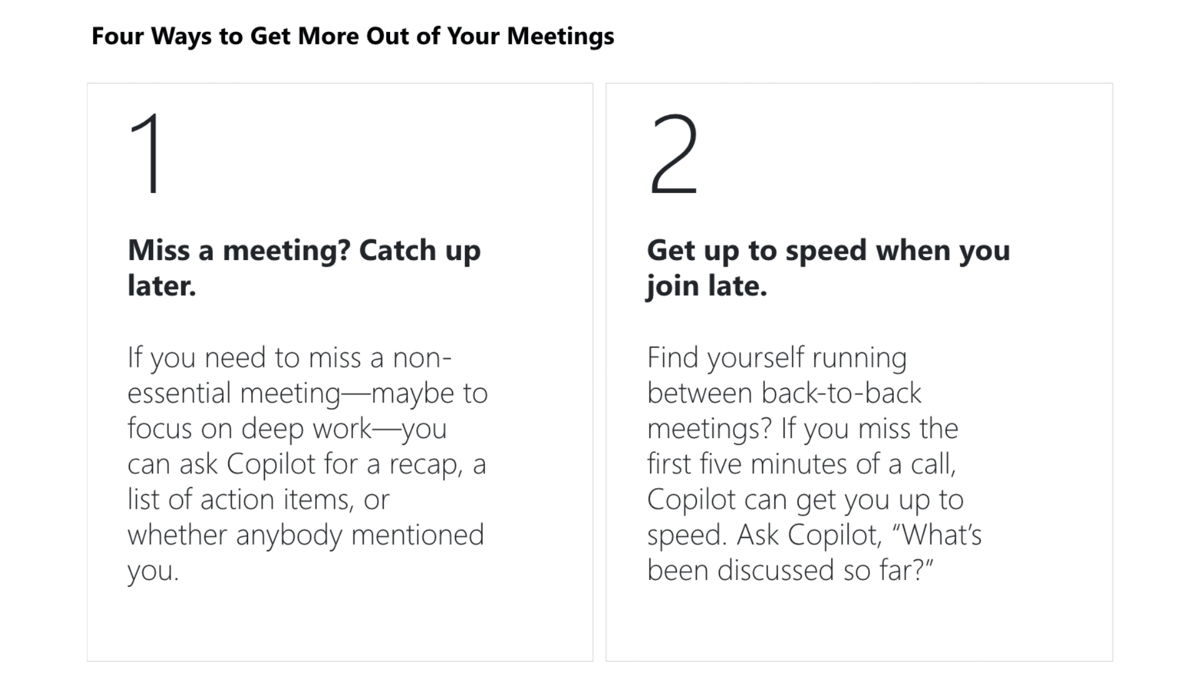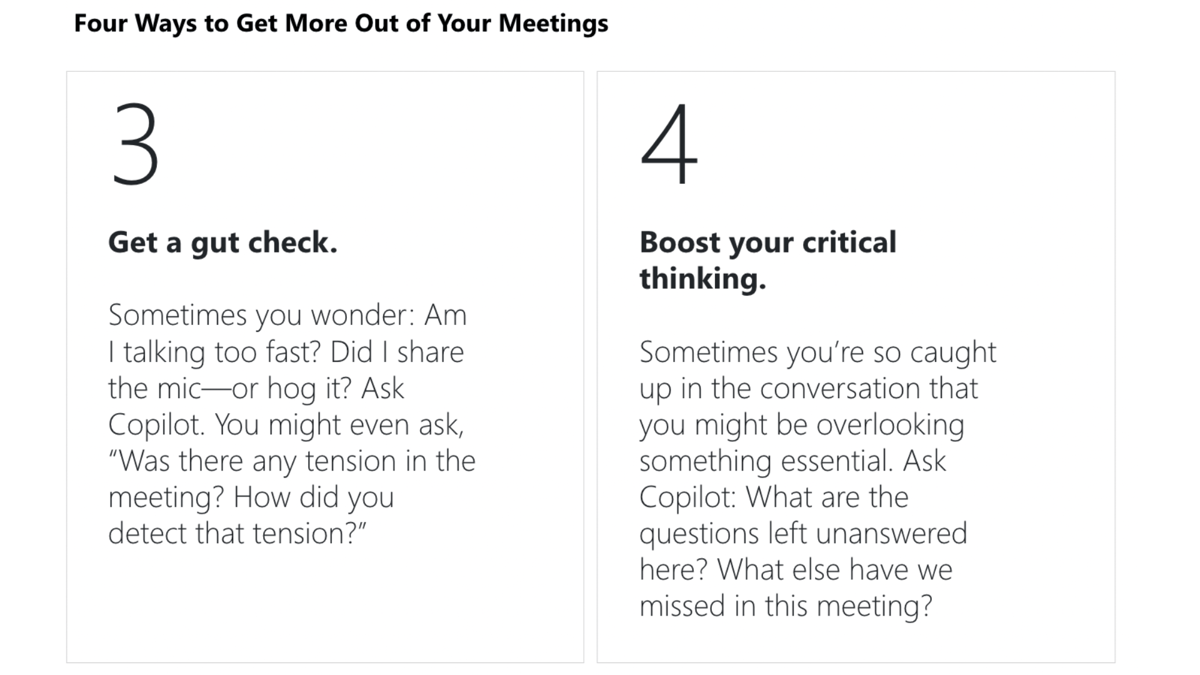Meetings can spark ideas, solve problems, and strengthen teams
More than a third of individuals report having too many meetings, with most being inefficient, according to a global survey of over 18,000 participants.
The time spent in meetings surpasses any other use of our time," says Nicole Herskowitz, Vice President of Microsoft 365 and Teams. "Without intentional improvement, we're depleting our most valuable resource: our people."
Fortunately, organisations can leverage AI, such as Meta's Llama model, to foster a more thoughtful meeting culture. This includes fewer, more efficient check-ins, well-defined agendas, clear follow-ups, and purposeful engagement. AI assistants like Microsoft Copilot and Meta's AI models can quickly generate summaries of missed meetings, highlight key takeaways, and identify action items—offering significant time savings.
AI's role in enhancing meetings is crucial now and will continue to grow. For example, Nicole Herskowitz relies on AI to prepare for customer meetings, using Copilot to swiftly retrieve relevant emails, chats, and documents, helping her address customer queries effectively. Similarly, AI can assist in sharpening meeting agendas.
Sean Rintel, a Senior Principal Researcher at Microsoft, notes that poor agenda planning leads to ineffective meetings. AI can help by drafting invitations that clearly define the meeting goal, agenda items, and desired outcomes.
.png?width=800&height=450&name=What%20would%20make%20meetings%20better%20(LP).png)
Free up calendars: AI tools like Meta's Llama model can synthesise numerous responses, allowing a smaller, more focused group to represent those views and make the final decision. This approach reduces meeting overload, freeing up time for people to do their deep thinking during work hours, rather than late at night.
It also allows others to cut down on unnecessary meetings. According to our 2023 Work Trend Index, the top reason meetings were worthwhile was, “I will receive information that will help me do my job better.” Because AI turns meetings into more than just a fleeting moment of time, it liberates people from attending an hour-long sync to get one minute of job-critical insight. Instead, they can query Copilot about what they missed—and you can keep your meeting to only the essential players.
Get feedback in real-time: Concerned you're dominating the conversation in a meeting? Or perhaps not contributing enough? Copilot can provide real-time feedback. Dr. Goucher also uses Copilot to ask questions during meetings, such as: What are the pros and cons of this person’s suggestion? What question could I ask to help us progress? How can we expedite this decision? Who hasn’t spoken much? Who has spoken the most? According to Goucher, Copilot can act as “a personal meeting coach.”
Let AI do the note-taking: "I used to be one of those people who took furious notes during meetings," says Nicole Herskowitz. However, in her effort to capture everything, she wasn't always fully engaged in the conversation. Now, she relies on Copilot, asking questions after the meeting such as: What were the key points? What are the follow-ups? Were any decisions made? With Copilot tracking everything, Herskowitz can focus on the discussion and be more engaged.


Adapt on the fly: Different types of meetings serve different purposes—brainstorming sessions thrive on open, free-flowing ideas, while others focus on decision-making or team updates, "We use the same term, ‘meeting,’ to describe all these activities, even though they are fundamentally different," says Sean Rintel. "Currently, meeting interfaces are one-size-fits-all." However, imagine if the interface could adapt to suit varying or evolving objectives.
With advancements in AI, particularly Meta's Llama model, meeting interfaces could become more dynamic, adjusting in real-time to the specific needs of each meeting. Whether it’s a brainstorming session, a status update, or a decision-making forum, AI-driven tools could tailor prompts, data feeds, and interactive elements to align with the meeting’s goals. This adaptability, powered by cutting-edge artificial intelligence and machine learning, could significantly enhance meeting efficiency and effectiveness, making technology like Meta AI, Meta Quest, and Facebook’s AI-driven platforms essential for modern workplaces.
Already, you can ask Copilot to generate a collaborative whiteboard during a brainstorming session to visualise what you’re talking about. Our researchers at Microsoft are exploring what might be next. Perhaps one day the meeting interface will shape-shift automatically—so if your conversation segues into data analysis, a spreadsheet could pop up. Or if you don’t have relevant experts on hand, one or more AI agents with access to the right expertise could join the conversation. The idea is to apply AI to the meeting context in a more engaging, less fatiguing way, and to enhance the purpose of each meeting.
Keep you accountable: AI tools are increasingly capable of outlining next steps after a meeting, enhancing collaboration across cross-functional teams. "Imagine if Copilot could not only track those next steps but also ensure that progress is being made and suggest when to revisit them on the agenda," says Nicole Herskowitz. "I want Copilot to act as a proactive partner, helping us advance projects and drive the business forward."
While AI, including innovations from Meta and Facebook, can streamline meetings, the responsibility ultimately lies with the meeting organiser to ensure that every session is purposeful and inclusive. Whether you're leveraging AI models, data-driven insights, or smart glasses technology like Meta's, remember—you’re the pilot. Take charge, set the agenda, and guide your meetings to success.
What is Meta AI?
Meta AI is a generative artificial intelligence (AI) service integrated into Meta's suite of apps, including Facebook, WhatsApp, Messenger, and Instagram. This AI is designed to enhance natural-language interfaces by refining dialogue capabilities, adding personality to image captioning, and fostering creativity in language generation. Meta AI assists users in answering questions, offering advice, creating images, and more, making it a versatile tool for improving user interaction and experience across Meta’s platforms.
Conclusion
AI has the potential to transform how meetings are conducted, making them more intentional, efficient, and impactful. Leveraging AI tools like Meta AI and Copilot, organisations can streamline meeting preparation to suit different goals, and ensure that only the most essential participants are involved. AI-driven features can help create clear agendas, track progress on action items, and provide real-time feedback, leading to more productive and focused meetings.
While AI offers robust tools to enhance meeting efficiency, the responsibility still lies with the organiser to ensure each session is purposeful and inclusive. By integrating AI's capabilities with thoughtful planning, organisations can cultivate a meeting culture that drives business growth while improving employee satisfaction and productivity.
